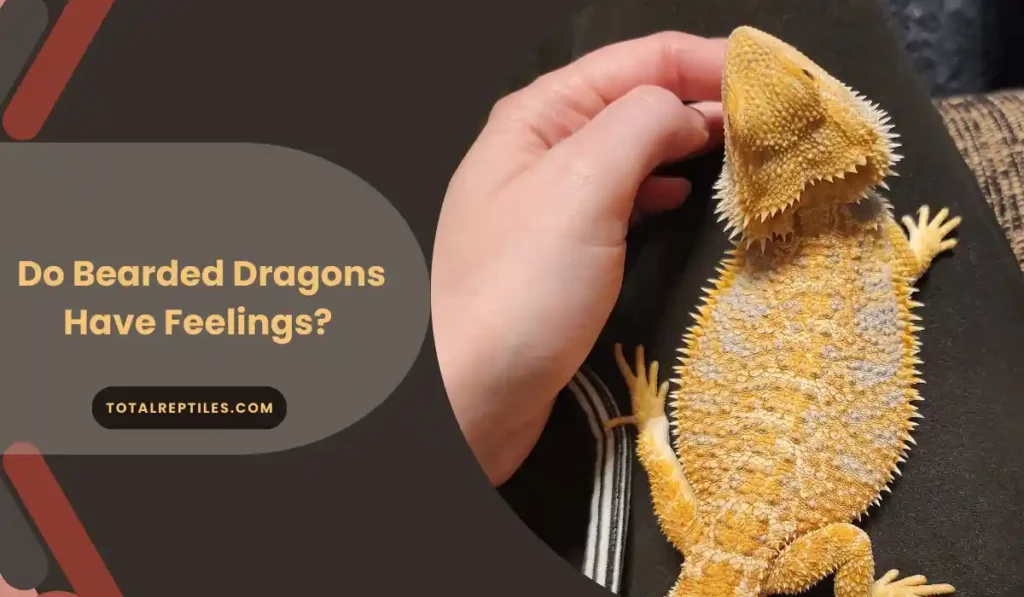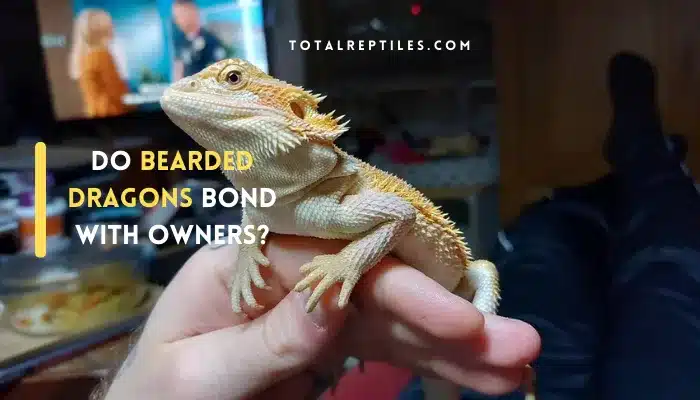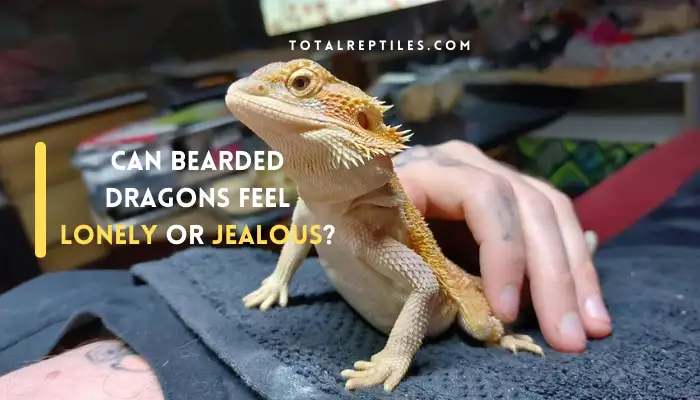Bearded dragons have soared in popularity as pet reptiles over the last few decades. Reptile enthusiasts like their docility, toughness, and distinctive temperament. A common question arises – do bearded dragons have feelings? Can they form emotional bonds with owners? Or are they cold automatons merely acting on instinct?
In this article, we’ll explore the emotional world of bearded dragons. You may be surprised to learn these reptiles are far more complex than their stoic exteriors suggest! Read on to learn whether bearded dragons feel emotions and what science reveals about their mental capacities.

Do Bearded Dragons Experience Emotions?
Now, onto the pressing question – are bearded dragons emotionally complex pets? Can they truly feel or merely act out fixed behaviours and instinctual programming?
Something in between is the answer. Bearded dragons have a capacity for emotion and forming bonds thanks to a hypothalamus. Their hypothalamus is undeveloped compared to mammals and other reptiles.
Role of the Hypothalamus
The middle brain structure hypothalamus, plays a key function in the neurological system. It links the nervous system to hormone control and helps regulate basic bodily processes and emotions.
In humans, dogs, and primates, the hypothalamus is well-developed. This gives mammals a broad emotional palette – happiness, sadness, jealousy, rage, affection, grief, etc.
Emotional Range in Bearded Dragons
In Bearded Dragons, the story is different. Their hypothalamus exists but is more primitive. This gives beardies emotional capacity, but only for basic emotions linked to survival:
- Anger – Defence mechanism for protection against threats
- Fear – Avoiding danger through caution or escape behaviours
- Pleasure – Seeking beneficial stimuli like warmth or food
Therefore, bearded dragons do not sense sophisticated social emotions like bonding, attachment, jealousy, or mourning. They operate mostly on instinct rather than higher reasoning ability.
Do Bearded Dragons Bond with Owners?
While they may not feel “love” as humans understand it, most bearded dragons do recognize and bond with their owners over time. You become a comfort rather than a threat.
Signs your bearded dragon may enjoy your company and trust you include:
- Sitting calmly on your lap or shoulder
- Scratching the tank glass when you enter to be let out
- Following you around a safe room, you allow them to explore
- Watching TV peacefully with you from a comfy perch
This bond arises because bearded dragons have learned to associate you with good things through consistent interaction. Eat, bathe, exercise outside their enclosure, and be friendly with them.

So they see you as a beneficial presence deserving of trust rather than a scary giant!
learn more about bearded dragon behavior
How Do Bearded Dragons Show Affection?
Bearded dragons have fundamental emotions and show signs of affection. These include subtle physical displays and tolerance of contact. Some examples are when beardies:
- Sit still on your lap or shoulder without struggling
- Lean into gentle strokes under the chin or on top of the head
- Follow you around a room they explore while out of their cage
- Wave gently or bob heads at you in a friendly fashion
- Lick your hand or attempt to nibble fingers/sleeves associated with food
- Poke tank walls or scratch floors, signalling they want to come out with you
So, interpret apparent bearded dragon affection as instinctual rather than emotional. But that makes the behaviours no less endearing! Time and patience help you bond with these friendly reptiles.
Tips for Bonding With Your Bearded Dragon
Want to maximize the trust and enjoyment of your company in your scaly pet? Here are top tips for strengthening bonds with a bearded dragon:
- Acquire a young beardie and interact frequently as it matures
- This allows lots of handling to build comfort over time
- Hand-feed favourite treats often
- Food association accelerates bonding
- Give them free roam time around a safe room
- They’ll associate you with exciting exploration
- Provide a nice warm bath 2-3 times weekly
- Most love to soak and swim!
- Gently pet their favoured spots (chin, head)
- This pleasurable stimulation cements bonds
- Keep routines consistent for care, feeding and handling
- Familiarity breeds confidence and trust
Read bearded dragon behavior even more carefully because their emotions are limited.
Interpreting Bearded Dragon Communication Cues
Bearded dragons can not show emotions by sounds or facial expressions like dogs, cats, and people. But their body language still communicates vital mood information.
Learn what behaviors indicate happiness vs. fear or aggression in your beardie. This helps ensure smooth handling and social success.
Here’s a handy table summarizing key bearded dragon communication signs:
| Emotion | Behaviors |
| Happy | Eyes wide/focused, mouth closed, sitting calmly, climbing onto lap, basking under bright light |
| Afraid | Closed eyes, hiding, darkened beard, hissing, stiff posture |
| Aggressive | Open mouth, beard/body blackening, head bobbing, inflated torso, lunging |
| Submissive | Slow head bobbing, arm waving, retreating |
So, when you see these cues, adjust your actions accordingly. Offer treats and petting for happiness signals. Give your beardie space, and do not rush in if it is scared or upset.
Understanding their perspective preserves the bond and keeps you both feeling secure and cared for!
Can Bearded Dragons Feel Lonely or Jealous?
Some exciting behaviours prompt the question – do bearded dragons get lonely or jealous? What about when they scratch walls or avoid other pets?
Truthfully, beardies don’t experience complex emotions like jealousy. They only socialize to mate or fight over territory and resources in the wild. They don’t need “friends” or companionship.
Apparent signs of loneliness or jealousy often link to territory defense. Glass scratching aims to drive off “competitors” in adjoining space. Avoiding other pets signals they want rival animals away from their domain.
Bearded dragons can get used to frequent owner involvement and even become attached. Dramatic drops in handling/bonding time may stress them and induce depression-like symptoms.

So ensure everyone interacting with your beardie commits consistent time daily. This provides security and mental stimulation vital to their health, even without complex social bonds.
The Scientific Perspective on Bearded Dragon Emotion
According to anecdotes, bearded dragons show affection, interest, and enjoyment. But does science agree? Recent research provides intriguing clues.
Social Learning Study
In an experiment at the University of Lincoln, scientists studied whether bearded dragons can learn behaviours from observations. This ability links to social/emotional complexity in animals.
The team housed beardies in a split terrarium with a sliding door between sides. A lizard on one side was trained to open the door for a food reward. The team then introduced naive lizards to the other side and played videos showing:
- Successful demonstration of the trained lizard opening the door
- An unsuccessful attempt by another beardie
- A human opening the door
The team checked if the naive lizards could mimic the door-opening behavior. The results were fascinating!
Only the beardies watching the successful beardie managed to slide the door open. Those seeing the human or failed attempt could not replicate this.
This suggests bearded dragons have social learning capacities not fully appreciated before. They could pick up new behaviours by observing skilled performance by another beardie.
This implies more vital emotional skills and intelligence than traditionally believed to be present in reptiles. Their emotions and behaviours have more complexity than pure instinctual responses.
Improvisation Abilities
In another study, researchers confronted hungry bearded dragons with a food reward visible but placed behind barriers. The team wanted to assess problem-solving abilities.
Remarkably, the lizards quickly grasped the situation and began displaying improvisational behaviours to reach the tempting meal.
- Some reared up vertically and used their full body weight to topple barriers
- Others nudged, pushed or rocked barriers out of position gradually
- Some started climbing the barriers despite awkwardness to access the food
Their spontaneous strategies showed remarkable adaptability and critical thinking. Like great apes and ravens, they innovated solutions by assessing the scenario. This is more the realm of higher intelligence than pure instinct.
Bearded dragons appear to be logical and rational in some situations. Their cognition extends well beyond reflexive responses.
This doesn’t prove beardies experience emotions identically to humans or even dogs. It confirms a level of cognitive and emotional processing experts may have underestimated.
Conclusion
Bearded dragons do appear capable of modest emotional experiences and establishing positive bonds. Their emotions go beyond automatic reactions; however restricted compared to mammals. Recognition, enjoyment, curiosity, and problem-solving indicate emotional and mental complexity. This means beardies take a more profound interest in us than we might assume!
Consistently pay attention to their communication and habitat needs. You can have a fulfilling interspecies friendship with your bearded dragon with patience and care.
And if you ask most beardie owners, they’ll swear their quirky lizard indeed gives – and receives – love in its own right!

